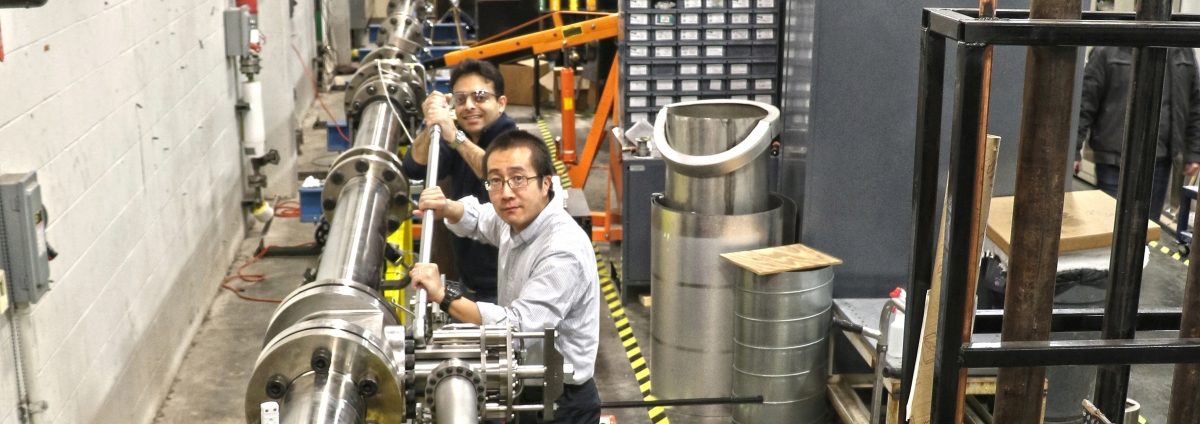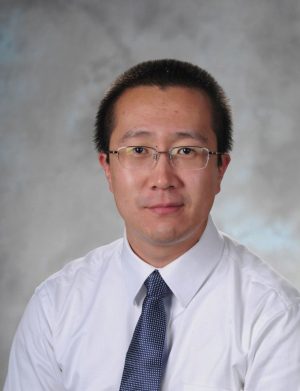
Putting the Aerospace Engineering Shock Tube to Work. Aerospace Engineering professor Wenting Sun, foreground, and doctoral student Miad Karimi are two of the authors of "Measurement of Methane Autoignition Delays in a Shock Tube under Supercritical Carbon Dioxide Conditions" the winner of the 2018 Markstein Paper Award. The other authors are research engineer Bradley Ochs, doctoral student Xiang Gao, and ME faculty Dr. Devesh Ranjan
The combustion research of aerospace engineering professor Wenting Sun has received some much deserved attention this spring. In March, the Eastern States Section of the Combustion Institute (ESSCI) recognized his investigations of new techniques for controlling the propulsion of hypersonic vehicles with the Irvin Glassman Young Investigator Lectureship and Award.
His Glassman lecture explored work that he launched in 2016 under the Air Force Office of Scientific Research (AFOSR)'s Young Investigator Researcher Program. His presentation,"The Effect of Ozone Addition on Combustion: What We Know and What We Don’t," delivered at the March 2018 ESSCI meeting, summarized his experimental and numerical investigations of explosive ozonolysis reactions.
Fast forward to July of 2018: “Measurement of Methane Autoignition Delays in a Shock Tube under Supercritical Carbon Dioxide Conditions,” a paper he co-authored, was selected to receive ESSCI's prestigious 2018 George H. Markstein Best Paper Award.
 |
| Prof. Wenting Sun |
Sun and his co-authors will formally receive the Markstein award in March of 2019 at the 11th US National Combustion Meeting hosted by Caltech.
"This is the first time we've been able to show autoignition at supercritical CO2 conditions using our newly built shock tube," said Sun of the most recent paper's findings.
"It enables measurement of critical fundamental combustion parameters in a completely new pressure region, especially those associated with combustion at a supercritical carbon dioxide [sCO2] condition suitable for a future power generation system. This is a regime where combustion kinetics has never been explored before."
The paper came out of a two-year, Department of Energy-funded collaboration between Sun's Reacting Flow and Diagnostic Research Group, AE professors Timothy Lieuwen, Suresh Menon, and mechanical engineering faculty Dr. Devesh Ranjan. Since installing a state-of-the-art shock tube in his lab last year, Sun and his colleagues have been able to more effectively focus on combustion kinetics for the supercritical CO2 power cycle.
"The supercritical CO2 power cycle has higher efficiency and allows almost 100 percent carbon capture with no NOx emission, so if we succeed with this technique, it has the potential to change the landscape of ground power generation," he said.
Noting that there are still hurdles to surmount, Sun said the research broke critical new ground in the field by using his lab's 69-foot shock tube to obtain autoignition delay measurements at the sCO2 condition. He is confident that there will be additional interest in pursuing this research.
The Markstein Ward is given by ESSCI to the author(s) of best paper based on the final extended abstracts submitted to the Eastern States Technical Meeting.
The Irvin Glassman award is given by ESSCI to either an outstanding investigator who is within seven years of earning a Ph.D. or an exceptional untenured professor in the first five years of a tenure-track appointment.